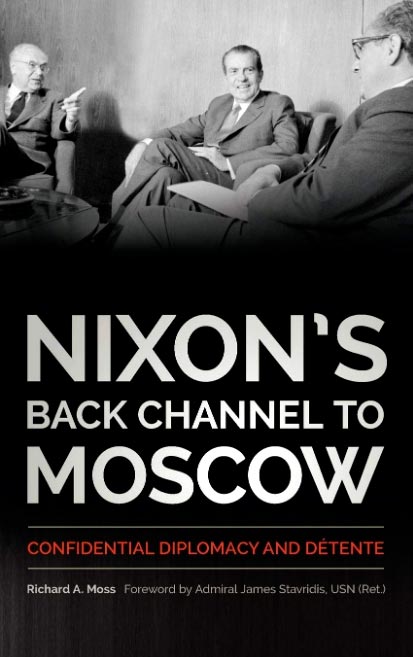 Nixon's Back Channel to Moscow Nixon's Back Channel to Moscow
Confidential Diplomacy and Détente
Richard A. Moss
Narrated by Richard Peterson
Available from Audible
Book published by University Press of Kentucky
Most Americans consider détente—the reduction of tensions between the United States and the Soviet Union—to be among the Nixon administration’s most significant foreign policy successes. The diplomatic back channel that national security advisor Henry Kissinger established with Soviet ambassador Anatoly Dobrynin became the most important method of achieving this thaw in the Cold War. Kissinger praised back channels for preventing leaks, streamlining communications, and circumventing what he perceived to be the US State Department’s unresponsive and self-interested bureaucracy. Nixon and Kissinger’s methods, however, were widely criticized by State Department officials left out of the loop and by an American press and public weary of executive branch prevarication and secrecy.
Richard A. Moss’s penetrating study documents and analyzes US-Soviet back channels from Nixon’s inauguration through what has widely been heralded as the apex of détente, the May 1972 Moscow Summit. He traces the evolution of confidential-channel diplomacy and examines major flashpoints, including the 1970 crisis over Cienfuegos, Cuba, the Strategic Arms Limitations Talks (SALT), US dealings with China, deescalating tensions in Berlin, and the Vietnam War. Moss argues that while the back channels improved US-Soviet relations in the short term, the Nixon-Kissinger methods provided a poor foundation for lasting policy.
Employing newly declassified documents, the complete record of the Kissinger-Dobrynin channel—jointly compiled, translated, annotated, and published by the US State Department and the Russian Foreign Ministry—as well as the Nixon tapes, Moss reveals the behind-the-scenes deliberations of Nixon, his advisers, and their Soviet counterparts. Although much has been written about détente, this is the first scholarly study that comprehensively assesses the central role of confidential diplomacy in shaping America’s foreign policy during this critical era.
REVIEWS:
“This narrative is often quite gripping, with wonderfully revealing quotations from the key actors. The author puts the reader on the shoulders of these men and their Soviet counterparts as they maneuver through three years of negotiations, posturing, and policy activities.”
—Jeremi Suri, author of Liberty’s Surest Guardian: American Nation-Building from the Founders to Obama “Nixon’s Back Channel to Moscow will become an instant classic. For all of the books that mention the back channels—Richard Nixon and Henry Kissinger’s most important foreign policy tools—this is the first to exhaustively mine the archives to explain their origin, how they were used, and to what end. Lucidly written and superbly researched, future works on Nixon foreign policy will have no choice but to consult this essential work. It is a must read to understand the era.”
—Luke Nichter, author of Richard Nixon and Europe: The Reshaping of the Postwar Atlantic World “Drawing back the curtain of history, [Moss] repeatedly shines light on high-stakes conversations that participants cryptically alluded to only in other memoranda or in their memoirs.”
—Passport “With engaging narrative and impeccable research, Moss has produced an important addition to Nixon historiography. Nixon’s Back Channel to Moscow sheds further light on what once had been mysterious and shrouded in shadows. It is an indispensable book for students of the Nixon years and those interested in the cost-benefit of back channel contacts. This book could not be more timely.”
—Parameters “This book raises interesting questions about democratic process and governmental effectiveness that merit attention, especially in a world in which foreign policy has become hyper politicized.”
—H-Diplo “Nixon’s Back Channel to Moscow provides a dispassionate look at informal diplomacy in the era of detente, and a careful assessment of its successes and some of its pitfalls. Moss’s matter of fact approach to President Nixon and Kissinger’s policies is a refreshing contribution to a field that is still obsessed with judging them.”
—International Affairs “Moss’s book must be widely read by diplomatic historians, international relations scholars, and practitioners. It would certainly provide abundant historical findings and implications for foreign affairs under a democratic government.”
—Political Science Quarterly “This is a fascinating read for those who wish to learn more about how Nixon and Kissinger secretly conducted American foreign policy during the early years of détente. ”
—Journal of American History
|

